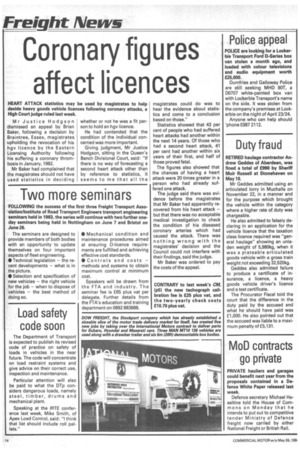Coronary figures affect licences
Page 16

If you've noticed an error in this article please click here to report it so we can fix it.
HEART ATTACK statistics may be used by magistrates to help decide heavy goods vehicle licences following coronary attacks, a High Court judge ruled last week.
Mr Justice Hodgson dismissed an appeal by Brian Baker, following a decision by Braintree, Essex, magistrates upholding the revocation of his hgv licence by the Eastern Licensing Authority following his suffering a coronary thrombosis in January. 1982.
Mr Baker had complained that the magistrates should not have used statistics in deciding whether or not he was a fit person to hold an hgv licence.
He had contended that the condition of the individual concerned was more important.
Giving judgment, Mr Justice Hodgson, sitting in the Queen's Bench Divisional Court, said: "If there is no way of forecasting a second heart attack other than by reference to statistics, it seems to me that all the magistrates could do was to hear the evidence about statistics and come to a conclusion based on those."
Statistics showed that 43 per cent of people who had suffered heart attacks had another within the next 14 years. Of those who had a second heart attack, 41 per cent had another within six years of their first, and half of those proved fatal.
The figures also showed that the chances of having a heart attack were 20 times greater in a person who had already suffered one attack.
The judge said there was evidence before the magistrates that Mr Baker had apparently recovered from his heart attack — but that there was no acceptable medical investigation to check the condition of his diseased coronary arteries which had caused the attack. There was nothing wrong with the magistrates' decision and the Council could not interfere with their findings, said the judge.
Mr Baker was ordered to pay the costs of the appeal.








































































































